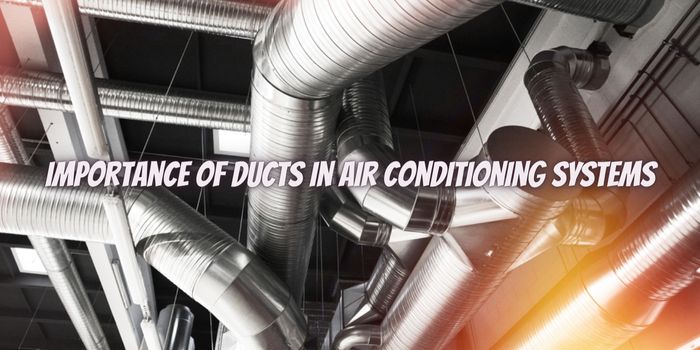Ducts are an integral and often overlooked component of an air conditioning system. These conduits serve as the circulatory system of a building’s HVAC (Heating, Ventilation, and Air Conditioning) system, facilitating the distribution of conditioned air to various spaces. While air conditioning units get much attention, the importance of ducts in ensuring efficient and effective cooling cannot be overstated. We will explore the critical role of ducts in air conditioning systems, highlighting their impact on comfort, energy efficiency, indoor air quality, and overall system performance.
Role of ducts in air conditioning systems
-
Temperature Control and Comfort:
Ducts are essential for regulating temperature and ensuring comfort within a building. They transport conditioned air from the air conditioning unit to different rooms and areas, allowing occupants to enjoy a consistent and comfortable indoor climate. Conditioned air may not reach its intended destination without well-designed and properly insulated ductwork, ushering in temperature variations and discomfort.
-
Energy Efficiency:
Efficient ductwork is paramount for optimizing energy efficiency in an air conditioning system. Ducts that are sealed, insulated, and designed to minimize heat gain or loss help ensure that cooled air is delivered efficiently to the living or working spaces. Inefficient ducts, on the other hand, can outcome in significant energy wastage, as the air conditioning unit must work harder to compensate for the loss of cooled air.
2. Indoor Air Quality (IAQ):
Ducts play a pivotal role in maintaining indoor air quality. They distribute conditioned air and circulate and filter the air throughout a building. High-quality air filters within the ductwork trap dust, pollen, allergens, and other airborne particles, preventing them from circulating and potentially causing respiratory problems or allergies. Properly maintained ducts help ensure that the air circulated is clean and healthy.
-
Airflow and System Performance:
Ducts are responsible for managing airflow within the HVAC system. Properly designed and sized ductwork ensures that the right volume of air is delivered to each room, maintaining balance and preventing overworking of the air conditioning unit. This optimized airflow contributes to the system’s overall performance and longevity.
-
Humidity Control:
Effective humidity control is another aspect influenced by ducts. Well-designed ductwork can help maintain the desired humidity levels in a building. Excess humidity can make indoor spaces uncomfortable, while insufficient humidity can lead to dryness and discomfort. Properly functioning ducts contribute to achieving the ideal balance of humidity, enhancing overall comfort.
-
Zoning and Room-by-Room Control:
Ductwork allows for the implementation of zoning and room-by-room control systems. This means that diverse regions of a building can have individual temperature settings, optimizing comfort and energy efficiency. Zoning and room-by-room control are particularly valuable in larger buildings or homes with varying occupancy patterns.
-
Consistent Airflow and Air Distribution:
Ducts ensure that conditioned air is evenly distributed throughout a building. This consistent airflow prevents hot spots and cold spots, allowing for a more pleasant and balanced indoor environment. It also ensures that conditioned air reaches every corner of a space, stemming stagnant or poorly ventilated areas.
-
Preservation of Building Structure:
Ductwork, when installed correctly, can help protect a building’s structural integrity. It stems moisture and humidity from accumulating within walls, ceilings, or floors, which can lead to structural damage and mold growth. Properly maintained ducts contribute to the longevity of the building itself.
-
Enhanced System Control and Monitoring:
Ductwork enables better control and monitoring of the air conditioning system. Modern HVAC systems often incorporate smart technology that allows for remote monitoring and adjustment of temperature settings and airflow, enhancing user convenience and energy efficiency.
Ducts are the unsung heroes of an air conditioning system, playing a critical role in temperature control, energy efficiency, indoor air quality, and overall system performance. They ensure that conditioned air reaches its intended destinations, providing comfort to occupants while minimizing energy wastage. Properly designed and maintained ductwork contributes to a healthier indoor environment by filtering and circulating clean air. Additionally, ducts enable zoning and room-by-room control, noise reduction, and consistent airflow distribution, enhancing overall comfort and satisfaction. As vital components of the HVAC system, ducts deserve recognition for their indispensable role in creating a comfortable and efficient indoor environment.
Hiring professionals for duct cleaning is a wise investment to improve the efficiency of your HVAC system. Trained technicians have the expertise and specialized equipment to thoroughly clean and maintain your ductwork, removing accumulated dust, debris, and contaminants. This cleaning enhances airflow, allowing your air conditioning system to operate more efficiently and reducing energy consumption and utility costs. Moreover, a clean duct system helps prevent blockages and promotes proper ventilation, which is crucial for indoor air quality. By entrusting this task to professionals, you ensure that your ducts are in optimal condition, promoting comfort and cost savings. If you are looking for such professionals, go to Duct Kings Houston.




